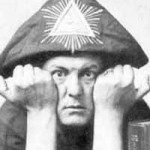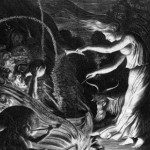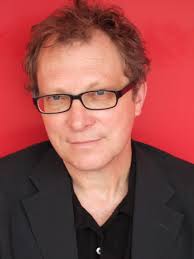 A great deal of my down time is spent researching and reading about Modern Paganism, but over the last couple of years I’ve begun to branch out a little bit so to speak. There are all kinds of figures who had a major impact not on just on Modern Paganism but on other areas of “the occult” and society in general. While searching for books on Emanuel Swedenborg, Carl Jung, and Helen Blavatsky I kept running into the name Gary Lachman over and over again. Who is Gary Lachman I wondered? It turns out that Gary Lachman was Gary Valentine in another life, the original bass player in the band Blondie and now a successful writer of esoteric and occult themed biographies and books. (I’ve now received an email from a member of the Rock and Roll Hall of Fame, my life is nearly complete.)
A great deal of my down time is spent researching and reading about Modern Paganism, but over the last couple of years I’ve begun to branch out a little bit so to speak. There are all kinds of figures who had a major impact not on just on Modern Paganism but on other areas of “the occult” and society in general. While searching for books on Emanuel Swedenborg, Carl Jung, and Helen Blavatsky I kept running into the name Gary Lachman over and over again. Who is Gary Lachman I wondered? It turns out that Gary Lachman was Gary Valentine in another life, the original bass player in the band Blondie and now a successful writer of esoteric and occult themed biographies and books. (I’ve now received an email from a member of the Rock and Roll Hall of Fame, my life is nearly complete.)
There’s something about Lachman’s style that resonates with me. He can be critical and skeptical at times, but there’s also a nice degree of belief there as well. Lachman stands somewhere in the middle of accepting everything at face value and being unnecessarily dismissive. Some of his books aren’t biographies in the usual sense and instead focus on the spiritual and esoteric aspects of a particular individual. His work on Jung is a great example of this. There’s the outline of an extraordinary life in its pages but also an examination of thoughts, ideas, and influences from someone who understands and is sympathetic towards them.
When I found out that Lachman was getting ready to release a new book on Aleister Crowley I seized the opportunity to both review the book and ask him some questions about his work. He happily agreed to answer them.
Jason: 1. How does one go from being a founding member of Blondie to writing about the occult, spirituality, and “New Age” type figures?
Gary Lachman: As I say in the book, I started reading about this sort of thing while playing in Blondie. I was always interested in ideas and was always a voracious reader. In the case of the occult or esoteric, over time, what started out as a youthful enthusiasm for weird stuff turned into a serious study of the history of esotericism.
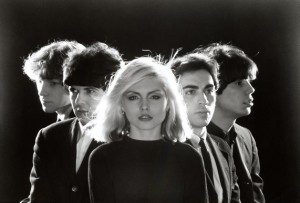 2. In your latest book you talk about how some of the members of Blondie were involved in occult practices back in the 1970’s (Debbie Harry consulting the I Ching was especially interesting). How prevalent were such leanings in rock during that time? Everyone knows that figures like David Bowie and Jimmy Page were interested in such things, but what about bands on the fringe or cusp of stardom?
2. In your latest book you talk about how some of the members of Blondie were involved in occult practices back in the 1970’s (Debbie Harry consulting the I Ching was especially interesting). How prevalent were such leanings in rock during that time? Everyone knows that figures like David Bowie and Jimmy Page were interested in such things, but what about bands on the fringe or cusp of stardom?
I don’t know about other bands on the NY scene at that time. I don’t think it was particularly popular; most people were into Warhol, not magic: it was too Sixties for that scene. In the case of Blondie, Chris had an interest in voodoo, satanism, black magic, but in a kitschy way – it was weird and fun – and Debbie’s interest was pretty much the same. I don’t know about them after I left, but I don’t have the impression that they took it very seriously. It was just around.
3. You describe yourself in your books as having an interest in the occult, but definitions of the occult vary from person to person. What do you consider “occult” and more specifically what parts of that definition are you most interested in?
To tell you the truth I’m not particularly interested in definitions. Occult means ‘unseen’ and as a generic term, it covers a lot of material. We can split hairs about it, but if you look at the books I’ve written, on Rudolf Steiner, Ouspensky, Blavatsky, Jung, etc., you’ll see that I’m interested in it in terms of the evolution of consciousness, both in the individual and the culture at large. That’s really my main concern, not spooks and vampires and all that fun stuff.
4. I told a friend of mine that I was reading your Crowley book and possibly interviewing you. Nervous laughter followed and she explained to me that she thinks your books, specifically Turn Off Your Mind: The Mystic Sixties and the Dark Side of the Age of Aquarius and A Dark Muse portray the occult in a very negative and unsympathetic way. I’ve never gotten that vibe from your work, but have you heard that type of criticism before?
I can’t account for your friend’s sense of humor, but although I am critical – any person with a mind of their own is, by definition – I can’t agree that I am unsympathetic. I do ask difficult questions about some sacred cows, especially in Turn Off Your Mind, which is a kind of revisionist look at the 60s occult counter-culture. That strikes me as more interesting and profitable – in terms of understanding it – then saying how groovy things were back then, as dozens of other books do.
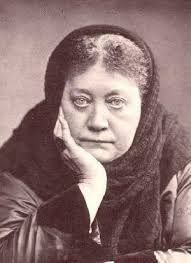 5. I really enjoyed your biography on Madame Blavatsky (Madame Blavatsky: The Mother of Modern Spirituality). I think of her as this towering, important figure in history, yet she seems to mostly exist on the margins of history these days. Why do you think she’s so often overlooked, not just in occult spiritualities but history in general?
5. I really enjoyed your biography on Madame Blavatsky (Madame Blavatsky: The Mother of Modern Spirituality). I think of her as this towering, important figure in history, yet she seems to mostly exist on the margins of history these days. Why do you think she’s so often overlooked, not just in occult spiritualities but history in general?
I think people think they know who and what HPB was about already, and accept the cliches and stereotypes about her, without really looking into who she actually was. She’s as important in the shaping of the modern world as Darwin, Marx or Freud, but the myths and half-truths that have been repeated over and over prevent us from seeing this. My book tries to redress this misunderstanding. This doesn’t mean I’m a ‘believer’, which is a silly way to look at these things. I simply see how important she was and try to make that clear.
6. I think Emanuel Swedenborg suffers in a similar way, a lot of “New Age” and occult books sometimes fail to even mention him. Do you have any thoughts on that? Is it perhaps that people think of him as a “Christian” thinker?
The same is true about Swedenborg. If people know anything about him, its that he took trips to heaven and hell, and talked with angels. They say, “All right, he’s Christian,” and put him in the same camp as the Jehovah Witnesses. Again, I wrote my book to show how misleading this is and what a fascinating character and thinker he was.
7. I read a review once where you were described as a disciple of (author) Colin Wilson and anyone familiar with the occult has most likely read at least one of Wilson’s books. What was your relationship with him like and what do you think his lasting legacy will be?
Colin Wilson was a friend and mentor. I wouldn’t say I was a ‘disciple’ – he wasn’t interested in those. But much of what I write is informed with his ideas about consciousness. I am planning to write a book about his work so you’ll have to wait until then to get the full picture.
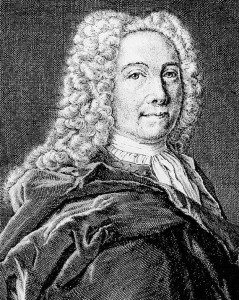 8. Have you ever come across a figure where you think to yourself “how did anyone believe in or look up to this person?”
8. Have you ever come across a figure where you think to yourself “how did anyone believe in or look up to this person?”
Often, and not only in regards to the occult. But it’s a big universe and I strive to be tolerant.
9. Aleister Crowley: Magick, Rock and Roll, and the Wickedest Man in the World is very much a biography in the classic sense of the word. Some of your other books on specific individuals tend to just deal with certain aspects of their lives, like finding the occult in Jung, or exploring the ideas of Swedenborg. Do you consider yourself a biographer or something a little different than that?
I don’t think of myself primarily as a biographer. My biographies are more critical studies, but publishers think no one will buy a book if you call it that. I am primarily interested in ideas, but also in the lives of the people who have the ideas. Like Blavatsky, Crowley led a relentlessly eventful life. Actually, his ideas are not that difficult, and in his case it was looking at how he lived them out and the result that interested me. It’s a cautionary tale.
10. Out of all the figures you’ve written about which one resonates the most with you? Do you have a particular favorite?
I like them all, but Ouspensky was an early hero. One of the first books about this sort of thing I read was his Tertium Organum. I always felt he had been short-changed by Gurdjieff, so I wanted to write a book telling his story. He was a brilliant philosopher and writer before he met Gurdjieff and sort of lost his way after he met him. This isn’t to say Gurdjieff is ‘bad’. On the contrary, he is one of the most important teachers of the last century. I just don’t think he really understood Ouspenky. Jung was another favorite; I first read him in my teens. I like the idea of having the chance to bring together my thoughts about these thinkers.
A QUICK BOOK REVIEW Aleister Crowley: Magick, Rock and Roll, and the Wickedest Man in the World by Gary Lachman. Tarcher Books, 400 pages. Even Crowley’s most ardent admirers will admit that he was, at best, a bit of a cad (and “cad” is probably far too kind of a word). He was often selfish and manipulative, and many of his most well known associates (including his wife Rose) ended up in an asylum after meeting Crowley. But even with his many faults, Crowley was also capable of great brilliance, and Lachman does a pretty fair job of documenting the best and truly worst of old Uncle Al. It’s not a sympathetic portrait, but Lachman also freely admits when The Beast gets it right.
This isn’t a book written for the Crowley devotee, it’s written for a more general audience, and I think it will serve that audience well. It’s not meant to have the depth of Kaczynski’s or Sutin’s Crowley biographies, and as a result fills in a particular Crowley niche. It’s also a “comparative approach” to Crowley at times, as it measures him against other influential “occult” and revolutionary figures of the early 20th Century like Jung and Gurdjieff.
One of the questions the book sets out to answer is why Crowley’s legacy and influence has been so lasting, especially in the rock and roll world. That was probably the part of the book I was most looking forward to reading, and alas, the answer isn’t totally there. Some of it certainly is, especially when it comes to well known figures like Jimmy Page (of Led Zeppelin) and David Bowie, but I was hoping for more. I am kind of a rock and roll and the occult nerd so my expectations were probably a littler greater than average. I’m not sure this is all Lachman’s fault, as my hopes had a lot to do with how the book was marketed.
Is this the best Crowley biography in the world? No, but for eight bucks on a Kindle or whatever it’s a great introduction to the Beast. It’s obvious pretty early on that Lachman isn’t a Crowley-disciple but he’s not a complete hater either. The Crowley that comes to light in Lachman’s book is of a rebel who never quite got over his upbringing in the Plymouth Brethren Church and whose genius was often interrupted by continually bad behavior. The end result is a figure whose second act after death was much more influential than his.
More books by Gary Lachman: The Quest for Hermes Trismegistus: From Ancient Egypt to the Modern World, The Caretakers of the Cosmos: Living Responsibly in an Unfinished World, Rudolf Steiner: An Introduction to His Life and Work, Madame Blavatsky: The Mother of Modern Spirituality, A Secret History of Consciousness, Jung the Mystic: The Esoteric Dimensions of Carl Jung’s Life and Teachings, Swedenborg: An Introduction to His Life and Ideas, and Turn Off Your Mind: The Mystic Sixties and the Dark Side of the Age of Aquarius. For anyone looking for a brief look at the life of Blavatsky and the mystic side of Carl Jung I whole heartedly recommend the books listed here.
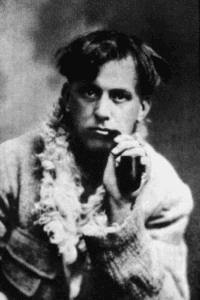 11. There were a lot of moments in your Crowley book that had me laughing at some of his antics. I know a lot of Thelemites and fans of Crowley who take everything the man ever wrote, said, or did extremely seriously. How do you think Crowley would feel about that? Was he capable of laughing at himself?
11. There were a lot of moments in your Crowley book that had me laughing at some of his antics. I know a lot of Thelemites and fans of Crowley who take everything the man ever wrote, said, or did extremely seriously. How do you think Crowley would feel about that? Was he capable of laughing at himself?
He could laugh at himself on occasion, but I think he was too involved in what other people thought of him, of his effect on them, to be really un-selfconscious in the way you need to be to have a sense of humor about yourself. He was very rarely out of character. He can be very funny though. Someone asked him what one should call a young, male swan. He answered “Why not call him Edgar?” He had a quick, intelligent wit and I found myself laughing quite a few times while doing the research.
12. You once practiced some of Crowley’s teachings with “zeal.” What caused you to move away from The Great Beast?
As I say in the book, I just got tired of Crowley’s ego, and the people I knew who were practicing Thelema were not particularly good role models. Reading Colin Wilson turned me in another direction. I lost interest in magic but not in consciousness.
13. Do you ever feel as if Crowley’s larger than life persona distracts and takes away from some of the other seminal occult figures of the last 200 years? There’s a lot written about Crowley but very little about someone like Samuel L. MacGregor Mathers for instance.
We know about Crowley mostly because of his super-sized life. That’s why he was picked up by the 60s counter-culture; he was living sex, drugs and rock and roll well ahead of everyone else. If he had been a bit more restrained, it’s unclear if we would know about him today, or at least as much. I do think it is a shame that many people become aware of the western esoteric tradition through him. But Mathers was a bit of a nut too.
 14. Most books about Crowley are either written by adherents or complete skeptics in all things magical. You sort of stand in the middle of those two extremes. Was that the “tone” you were trying to convey while writing the book?
14. Most books about Crowley are either written by adherents or complete skeptics in all things magical. You sort of stand in the middle of those two extremes. Was that the “tone” you were trying to convey while writing the book?
Sympathetic, but critical, as in all of my books. Also, I wanted to use Crowley was a example of the ‘let it all hang out’ ethos in order to question it, as I think he took it to its extreme and showed that it doesn’t work.
15. I sometimes find myself referring to Crowley affectionately as “Uncle Al,” but Crowley was certainly not all sunshines and rainbows. How do you feel about the modern tendency to overlook many of Crowley’s faults?
That’s one aspect of the book. Yes, let’s clear up all the tabloid rubbish that was published about him in his day, but let’s also not make him out to be some liberating hero. He was a brilliant, highly talented individual who had more than a few flashes of genius, but he was a colossal pain to practically everyone around him. In other words, let’s not be hero-worshippers or ignorant detractors, but serious about understanding who and what he was. There’s no point in approaching him or anyone else in any other way.
16. The idea that Crowley was a part of the British Secret Service has become very popular over the last ten years especially. In the book you mostly discount such speculation. What is it that makes some people think Crowley was a super-spy? What specifically has led you to dismiss such ideas?
Richard Spence, who wrote Secret Agent 666, admits that most of his argument is built on speculation and circumstantial evidence. I think some people will grab on to anything that will show that we are all wrong about Crowley. I just wasn’t convinced. I could be wrong, but I’m inclined to think he wasn’t an occult James Bond.
17. One of the book’s themes is that Crowley has become a cultural icon in the nearly seventy years since his death. What do you attribute that to? Is it one particular thing or a combination of factors?
As I say, he was picked up by the 60s hippies and his philosophy fits the rock and roll ethos to a tee. So it was a natural. None of the other mystical figures embraced by the 60s – Jung, Blavatsky – went on to become pop culture icons. My book asks why Crowley did and tries to provide an answer.
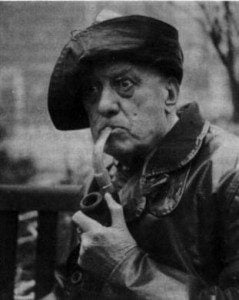 18. In the book you sometimes compare Crowley to other important 20th Century figures, most notably Jung and Gurdjieff. As someone who has read a lot of Crowley biographies I found that to be an interesting (and novel) approach. Was that a conscious decision made before you started writing the book or just a natural part of the process?
18. In the book you sometimes compare Crowley to other important 20th Century figures, most notably Jung and Gurdjieff. As someone who has read a lot of Crowley biographies I found that to be an interesting (and novel) approach. Was that a conscious decision made before you started writing the book or just a natural part of the process?
As I know and have written about Gurdjieff, Jung, Steiner, Blavatsky and so on it is only natural to make comparisons. I’m a comparative esotericist, you might say.
19. What kind of reaction to the Crowley book do you expect from organizations like the O.T.O.? Do you expect a lot of criticism?
I expect it will raise some eyebrows and perhaps garner some bad reviews, but I hope they like it.
20. With Crowley in the rear view mirror what are you currently working on? (Please tell me you are working on a Dion Fortune biography.)
I’m current working on a history of western consciousness from the esoteric point of view. But I do have an essay on Dion Fortune in a collection coming out in the fall called Revolutionaries of the Soul, with Quest Books.
More 20 Questions: Lon Milo DuQuette, Peter J. Carroll









